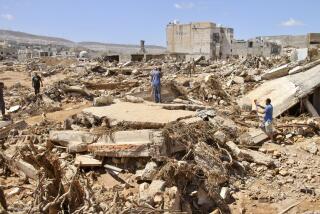Pyramid Power in Albania
- Share via
TIRANA, Albania — Adhesive tape holds Edi Rama’s face together. Bruises cast shadows around his eyes and nose. His lips are swollen from stitches inside his mouth.
Rama, a prominent dissident who opposes the conservative government of President Sali Berisha, was beaten one night last month on his way home from a restaurant. The culprits, he says, were two silent men dressed in black. Agents of the dreaded SHIK state security service, Rama claims.
The attack was among a handful carried out on leading critics of the government at a time when Berisha is under pressure for having stood by as pyramid schemes fleeced Albania’s impoverished masses of their savings.
When the pyramids began to collapse, crowds rioted throughout the small country, and opposition activists demanded that the government step down. Berisha’s response was to call out the army and, according to human rights officials and victims, initiate a campaign of arrests and intimidation of opponents. The government maintains that it has only acted to quell violence.
The pyramid crisis and Berisha’s handling of it have focused attention on the flaws of a government that claimed to be democratic. The situation poses a dilemma for the Clinton administration, which was Berisha’s fond supporter until fraud in last May’s national election was so blatant that Washington had to distance itself.
Now, U.S. diplomats gingerly raise human rights issues with the Berisha government, but there has been no formal protest because of what officials say is a lack of conclusive evidence.
Other beating victims included a senior official of the opposition Socialist Party of Albania--attacked about a block from Berisha’s police-protected residence--and the brother of Albania’s most prominent writer.
The trouble deepened this week when the government blocked opposition demonstrations after riots left three people dead in the southern port city of Vlore, where a police officer also was shot to death Wednesday. A 10-party opposition coalition, formed after the pyramid scandal to organize protest against the government, accused Berisha of inciting violence by preventing peaceful demonstrations. Berisha’s prime minister, Aleksander Meksi, blamed the unrest on “leftists” trying to reimpose communism.
Albania emerged from more than four decades of paranoia and Stalinist isolation with its first multi-party elections in 1991. Berisha--seen by the West at the time as a democrat despite his years as a Communist apparatchik--was first elected in 1992, thanks in large part to U.S. and European support. But elections again last year were marred by widespread irregularities, which the U.S. State Department, in its annual human rights report, labeled “a significant step backward” in Albania’s efforts to build a democratic system.
Amid the charges of fraud, Berisha’s Democratic Party of Albania, or PDS, won an overwhelming majority in parliament. The opposition now claims that the PDS used money from the pyramid companies to finance its 1996 campaign, a charge Berisha’s aides deny.
But while the pyramid schemes brought devastating economic damage to the people of Albania, they also had psychological and political consequences, critics say. Dissidents such as Rama say the false sense of prosperity created by the pyramid schemes helped to keep the government afloat and made it difficult to rally opposition to the president. The fast money lulled people into complacency. Issues of human rights and justice were ignored.
“It was very important for Sali Berisha to have these [pyramid] companies active, to create the illusion that we can be rich without being free,” the bruised and battered Rama said as he lay in bed recovering from his injuries.
“Pyramids are the direct consequence of all the political corruption of Albania.”
More to Read
Sign up for Essential California
The most important California stories and recommendations in your inbox every morning.
You may occasionally receive promotional content from the Los Angeles Times.














